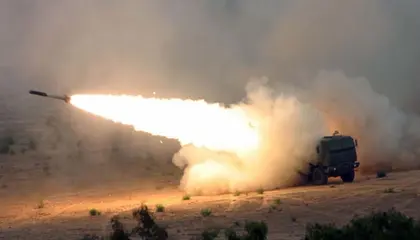Massed Russian missile attacks or the launch of a giant ground offensive, or maybe even both at the same time, are probably the direst predictions thrown out by some pundits and opinion-makers on the eve of the one-year anniversary of the start of the Russo-Ukrainian War.
But the more likely scenario, most observers in Kyiv and abroad generally agreed, was that Friday and the 365-day mark of the Kremlin’s attempt to conquer Ukraine in three days will see a spike in Moscow-generated propaganda and little visible change to Russia’s bloody offensives in Ukraine’s eastern regions.
JOIN US ON TELEGRAM
Follow our coverage of the war on the @Kyivpost_official.
Andriy Danylov, Secretary of Ukraine’s National Security Council, in Feb. 16 comments to the TSN television channel said the Russian air force was planning a “new massed missile attack on Ukraine” on Feb. 23 or Feb. 24, and that Moscow might well parallel the missile strikes with a commitment of major ground forces to Russian army assaults in progress in Ukraine’s eastern Donbas regions. The remarks echoed predictions made by Defense Minister Oleksiy Reznikov on Feb. 2.
Ukrainians are unimpressed
Danylov and Reznikov’s suggestion that a major Russian escalation is in the offing triggered relatively little stir in Ukrainian news platforms. Some outlets suggested a devastating, anniversary-linked attack on Ukraine might well be desired by Moscow, yet due to limited Kremlin resources and a strong Armed Forces of Ukraine (AFU) were probably not likely. Troops on the line contacted by Kyiv Post were dismissive of an anniversary-linked offensive.

Latest on Russia’s Intransigence to End War Against Ukraine
“In Donbas we don’t expect any big attack. They [the Russians] don’t have resources for major attack,” said soldier Serhiy Volkov, in a phone call. “All this talk about a major offensive is an information attack by the Russians, they’re just trying to undermine the confidence of [our] troops.”
Asked to comment on Russian President Vladimir Putin’s reported objective of conquering all of Ukraine’s Donbas region by the end of March, Volkov, a frontline combatant in the Avdiivka sector, joked: “What year?”
Some Ukrainian officials and institutions, likewise, have downplayed the possibility of a major Russian military effort tied to the one-year anniversary of the war.
“According to our information, the Russian command does not have sufficient resources for large-scale offensive actions. The main goal of the Russian troops remains to achieve at least some tactical success in the east of Ukraine,” Andriy Chernyak, a representative of the Main Intelligence Directorate of the Ministry of Defense of Ukraine, said in Feb. 11 comments to Kyiv Post.
Air Force spokesman Yuriy Ihnat, in Feb. 19 public comments said that the Kremlin has fired off so many cruise and ballistic missiles at Ukraine’s power grid that it is running out of munitions, that a massed missile attack, due to ammo shortages, is unlikely.
“[Russia’s] atypical shelling of Ukraine with a small number of missiles is probably related to the lack of weapons and Russia’s desire to keep Ukrainians nervous and tense before the anniversary of the full-scale invasion.”
Russians running out of steam
According to AFU official statements, the Kremlin kicked off a multi-vector offensive in early February aimed at conquering Ukraine’s Luhansk and Donetsk regions in their entirety, with the heaviest assaults focusing on Bakhmut and Vuhledar, and secondary attacks aimed at the towns Kreminna and Maryinka. The AFU on Wednesday claimed it had launched limited counterattacks and recovered lost ground in Bakhmut and Vuhledar. Kyiv Post researchers observed credible video confirming AFU troops in recently captured Russian positions in the Bakhmut sector.
“The enemy during the past 24 hours has not had a single territorial success,” said Robert Brovdi, a reconnaissance group commander in the Bakhmut sector, in a Feb. 22 Telegram vlog. “The situation remains tense, but let me assure you, we are in control.”
Two member of the AFU in the Vuhledar sector told Kyiv Post substantial Russian attacks had been in progress for more than a week and that Ukrainian defenses were holding. Substantial change to Russian tactics and attempts to gain ground were unlikely on Friday, they said.
The week leading up to the one-year anniversary of Russia’s invasion has seen a spike in long-range bombardments by both sides. Russian artillery, mortars and rockets hit civilian homes and businesses in Kherson and Kharkiv on Wednesday, official statements said.
American-made HIMARS rockets, a precision-guided weapon employed by the AFU primarily to strike Russian army ammunition depots and headquarters deep behind the lines, struck the airport in the Russian-occupied city of Mariupol in a Wednesday morning attack, said mayor-in-exile Petro Andriushchenko in a statement. A 12-missile salvo targeted Russian combat units, he claimed. Russian information platforms confirmed the HIMARS strike took place and claimed no one was hurt.
The pro-Russia Readovka information platform claimed that the AFU has kicked off a campaign of intensified attacks of civilian infrastructure in the lead-up to the one-year anniversary, and that on Feb. 22 alone AFU artillery strikes, Mariupol aside, hit the Donbas cities Makiivka, Snizhne, Shakhtarsk, Chystiakove and Khartsysk. The major city Donetsk was particularly hard hit, and intensified AFU bombardments of Russia-held cities on Friday are likely, the site said.
You can also highlight the text and press Ctrl + Enter










